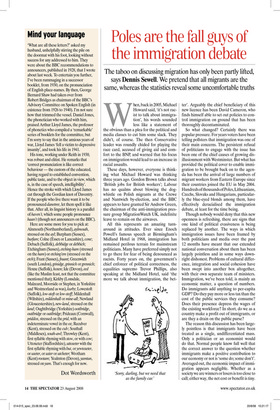Mind your language
‘What are all these letters?’ asked my husband, unhelpfully stirring the pile on the doormat with his foot, looking without success for any addressed to him. They were about the BBC recommendations to announcers, published in 1928, that I wrote about last week. To entertain you further, I’ve been rummaging in a successor booklet, from 1930, on the pronunciation of English place-names. By then, George Bernard Shaw had taken over from Robert Bridges as chairman of the BBC’s Advisory Committee on Spoken English (in existence from 1926 to 1940). I’m not sure how that trimmed the vessel. Daniel Jones, the phonetician who worked with him, praised Arthur Lloyd James, the professor of phonetics who compiled a ‘remarkable’ series of booklets for the committee, but I’m sorry to say that in the anxious years of war, Lloyd James ‘fell a victim to depressive insanity’, and took his life in 1941.
His tone, working under Reith in 1930, was robust and elitist. He remarks that ‘correct pronunciation is like correct behaviour — the custom of the educated, having regard to established convention, public taste, and to the object in view, which is, in the case of speech, intelligibility’. Hence the stroke with which Lloyd James cut through the Gordian knot of Daventry. If the people who live there want it to be pronounced danetree, let them spell it like that. After all, its linguist history is a parallel of haven’t, which some people pronounce haan’t (though not announcers on the BBC). Here are some more for you to pick at: Alnmouth (Northumberland), aylmouth, stressed on the ayl; Burpham (Sussex), burfam; Colne (Essex or Lancashire), cone; Debach (Suffolk), debbidge or debbich; Etchingham (Sussex), etching-ham (stressed on the ham) or etching’em (stressed on the etch); Frant (Sussex), fraant; Greenwich (south London), grinidge, grinnich or grennich; Hoxne (Suffolk), hoxen; Ide (Devon), eed (like the Muslim feast, not that the committee mentioned that); Kirkby (Lonsdale, Malzeard, Moorside or Stephen, in Yorkshire and Westmorland as was), kurby; Lowestoft (Suffolk), low-stoft or low-stoff; Mildenhall (Wiltshire), mildenhall or mine-all; Newland (Gloucestershire), new-land, stressed on the land; Oughtibridge (Yorkshire) ootibridge, outibridge or oatibridge; Prideaux (Cornwall), priddox, stressed on the prid, with an indeterminate vowel in the ox; Reculver (Kent), stressed on the culv; Southall (Middlesex), south-awl; Throwley (Kent), first syllable rhyming with stow, or with cow; Uttoxeter (Staffordshire), uttoxeter with the first syllable rhyming with but, or yewtoxeter, or uxeter, or uxter or utcheter; Wrotham (Kent) rootam; Yealmton (Devon), yamtun, stressed on yam. That’s enough for now.
Dot Wordsworth


























































 Previous page
Previous page